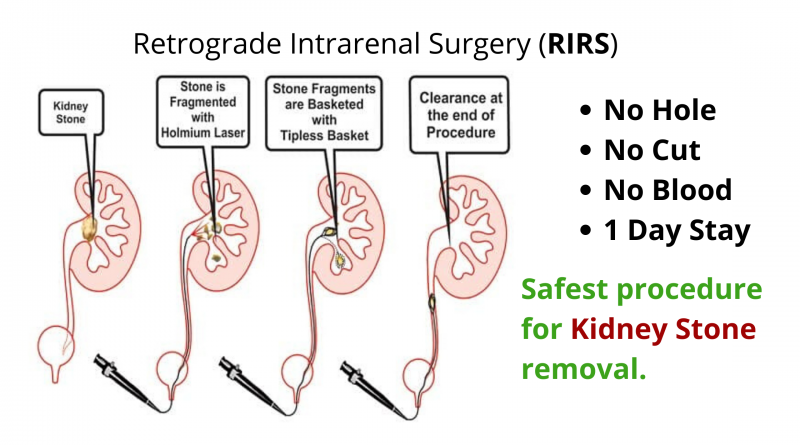The surgical treatment of urinary stone disease in elderly patients is challenging because age-related physiological changes in the cardiovascular, respiratory and nervous systems may increase the incidence of surgical complications and medical problems & For All Kidney Stone Problems, Consult Dr Vamsi Krishna the Best Urologist in Hyderabad. Although recent studies have demonstrated the effectiveness and safety of percutaneous nephrolithotomy (PNL) for elderly patients, most of the urologists often hesitate to recommend PNL in this population because of the increased incidence of adverse medical conditions and hemorrhagic or septic complications.
Retrograde intrarenal surgery (RIRS): It is an endoscopic surgical procedure used to remove kidney stones. In this method, a scope is passed through the urinary opening (urethra) into the bladder, and then, it is moved up [retrograde (upper urinary tract)] to reach the kidney. RIRS has been demonstrated as an alternative treatment modality to PNL and shock wave lithotripsy (SWL) with high success rates and minimal morbidity in the treatment of renal stones even for higher stone burdens. However, no previous study has examined the outcomes of RIRS in elderly patients. In this study, we reviewed our RIRS experience in patients older than 60 years, and we compared their operative and postoperative parameters with our younger patient database.
Urinary system stone disease is a term that includes kidney, ureter, bladder, and urethral stones. Urinary system stone disease is quite a common health problem that affects 2-3% of people and causes serious problems if not treated. It occurs more frequently in hot and arid climate zones, is associated with genetic factors and nutrition; our country is one of the countries where the incidence of stone is relatively high. The presence of stone disease in the family increases the risk; appears more often in males. The probability of stone recurrence is over 50% if no appropriate treatment is applied in a person with stone disease.
RIRS (retrograde intrarenal surgery):
Retrograde intrarenal surgery (RIRS) is a procedure for doing surgery within the kidney using a viewing tube called a fiberoptic endoscope.
In RIRS the scope is placed through the urethra (the urinary opening) into the bladder and then through the ureter into the urine-collecting part of the kidney. The scope thus is moved retrograde (up the urinary tract system) to within the kidney (intrarenal).
RIRS may be done to remove a stone. The stone is seen through the scope and can then be manipulated or crushed by an ultrasound probe or evaporated by a laser probe or grabbed by small forceps, etc.
RIRS is performed by a specialist, a urologist (endourologist) with special expertise in RIRS. The procedure is usually done under general or spinal anaesthesia.
The advantages of RIRS over open surgery include a quicker solution to the problem, the elimination of prolonged pain after surgery, and much faster recovery.
How Retrograde Intrarenal Surgery (RIRS) is Done:
A thin instrument (flexible renoscope) in diameter of approximately 3 mm, which has a light source and obtains an image with the fiberoptic system, is passed through the urethra and the urinary bladder under general anaesthesia. The entrance to the path providing the connection between the kidneys and the urinary bladder (ureter) is provided and the kidney is reached bypassing the ureter in order to break the stone that has settled in the kidney. A kidney stone is broken using a laser power source that can pass through the renoscope. After the breaking process, large pieces of stone are taken out, the pulverized fragments are expelled from the kidneys. A biopsy may be obtained if any mass or suspicious formation is encountered during this period, and the treatment may be performed with endoscopic scraping (resection) in the same session.
During this operation, the surgeon can enter all the rooms of the kidney and can break the stones with the aid of a laser by controlling the tip of the instrument under direct view.
Retrograde Intrarenal Surgery (RIRS) has become an important alternative for stone treatment with the development of effective and safe stone breakers such as new-generation flexible renoscopes and holmium lasers. Today, most small and medium-sized kidney stones are successfully treated with Retrograde Intrarenal Surgery (RIRS) without the need for open surgery or percutaneous nephrolithotomy (PCNL). Thus, the kidney can be reached without opening a hole in the abdominal wall, and the stones can be completely broken and cleaned with the flexible renoscope and laser by entering through the urinary canal. This allows patients to be discharged sooner and return to their daily lives in a very short period of time.
The stone type is determined after the operation by analyzing the pieces of stone obtained, thus some stones can be treated with some lifestyle recommendations and medical treatments, and some stones can be prevented from being formed again.
New modality to treat kidney stones without any cut or hole Ultrathin digital flexible ureteroscope is passed into the kidney through the urinary passage and stones are powdered with Laser. Especially Beneficial in High-Risk Patients, Like Cardiac Patients on Antiplatelets, Chronic Kidney Diseases, Solitary, Functioning Kidneys, Pediatric Patients as more invasive procedures like PCNL or Open Surgery can be risky.
Benefits & Advantages of Retrograde Intra Renal Surgery (RIRS) for Kidney Stones Treatment:
- No hole
- No cut
- The safest way to remove the kidney stone.
Pediatric Patients: RIRS, Mini PCNL, ESWL (USG Guided, Dornier, ESWL)


